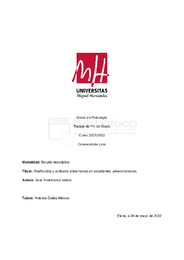Por favor, use este identificador para citar o enlazar este ítem:
https://hdl.handle.net/11000/27996Registro completo de metadatos
| Campo DC | Valor | Lengua/Idioma |
|---|---|---|
| dc.contributor.advisor | QUILES, YOLANDA | - |
| dc.contributor.author | Torreblanca Valero, Sara | - |
| dc.contributor.other | Departamentos de la UMH::Psicología de la Salud | es_ES |
| dc.date.accessioned | 2022-10-21T09:38:42Z | - |
| dc.date.available | 2022-10-21T09:38:42Z | - |
| dc.date.created | 2022-06 | - |
| dc.identifier.uri | https://hdl.handle.net/11000/27996 | - |
| dc.description.abstract | El Realfooding promueve un estilo de vida que rechaza los alimentos ultraprocesados, además de tratar de propiciar una alimentación saludable, defendiendo la “comida real” (“realfood”). Se considera que este movimiento puede promover conductas alimentarias de riesgo. Es por ello que el objetivo de este estudio fue examinar la relación existente entre el movimiento Realfooding y las actitudes alimentarias características de los trastornos de la conducta alimentaria (TCA), la Ortorexia Nerviosa (ON) y la autoestima. Se trata de un estudio transversal en el que participaron 248 estudiantes universitarios españoles, 189 mujeres, 51 hombres y 2 personas de género no binario, con una edad media de 21,49 años (DT= 2,37). Se administró un cuestionario sobre datos sociodemográficos, el Eating Attitudes Test (EAT-26), el cuestionario ORTO-11-Es, la Escala de Autoestima de Rosenberg (RSE) y un cuestionario sobre Realfooding ad-hoc. El 42,1% de los participantes seguían en Instagram alguna cuenta que publicaba contenidos relacionados con el Realfooding. Los grupos con mayor riesgo de ON y de TCA mostraron puntuaciones significativamente superiores en Realfooding frente a los grupos de menor riesgo, así como una relación positiva y significativa entre estos trastornos y el Realfooding. Los resultados encontrados sugieren una relación entre el seguimiento de este movimiento y el desarrollo de actitudes alimentarias de riesgo, sobre todo en mujeres. | es_ES |
| dc.description.abstract | Realfooding promotes a lifestyle that rejects ultra-processed foods, in addition to trying to promote healthy eating, defending the "real food". It is considered that this movement can promote risky eating behaviors. That is why the objective of this study was to examine the relationship of the Realfooding movement with attitudes characteristic of eating disorders, Orthorexia Nervosa (ON) and self-esteem, taking into account the gender variable.That is why the objective of this study was to examine the relationship between the Realfooding movement and eating attitudes characteristic of eating disorders (ED), Orthorexia Nervosa (ON) and self-esteem. This is a cross-sectional study in which 248 Spanish university students participated, 189 women, 51 men and 2 people of non-binary gender, with a mean age of 21.49 years (SD= 2.37). There were administered a questionnaire on sociodemographic data, the Eating Attitudes Test (EAT-26), the ORTO-11-Es questionnaire, the Rosenberg Self-Esteem Scale (RSE) and an ad-hoc Realfooding questionnaire. 42.1% of the participants followed an account on Instagram that published content related to Realfooding. The groups with the highest risk of ON and eating disorders showed significantly higher scores in Realfooding compared to the lower risk groups, as well as a positive and significant relationship between these disorders and Realfooding. The results found suggest a relationship between following this movement and the development of risky eating attitudes, especially in women. | es_ES |
| dc.format | application/pdf | es_ES |
| dc.format.extent | 36 | es_ES |
| dc.language.iso | spa | es_ES |
| dc.publisher | Universidad Miguel Hernández de Elche | es_ES |
| dc.rights | info:eu-repo/semantics/openAccess | es_ES |
| dc.rights | Attribution-NonCommercial-NoDerivatives 4.0 Internacional | * |
| dc.rights.uri | http://creativecommons.org/licenses/by-nc-nd/4.0/ | * |
| dc.subject | realfooding | es_ES |
| dc.subject | trastornos de la conducta alimentaria | es_ES |
| dc.subject | ortorexia nerviosa | es_ES |
| dc.subject | autoestima | es_ES |
| dc.subject | universitarios | es_ES |
| dc.subject | eating disorders | es_ES |
| dc.subject | orthorexia nervosa | es_ES |
| dc.subject | self-esteem | es_ES |
| dc.subject | university students | es_ES |
| dc.subject.other | CDU::1 - Filosofía y psicología::159.9 - Psicología | es_ES |
| dc.title | Realfooding y actitudes alimentarias en estudiantes universitarios/as | es_ES |
| dc.type | info:eu-repo/semantics/bachelorThesis | es_ES |

Ver/Abrir:
TFG-Torreblanca Valero, Sara.pdf
755,16 kB
Adobe PDF
Compartir:
 La licencia se describe como: Atribución-NonComercial-NoDerivada 4.0 Internacional.
La licencia se describe como: Atribución-NonComercial-NoDerivada 4.0 Internacional.
Herramientas de Administrador
.png)